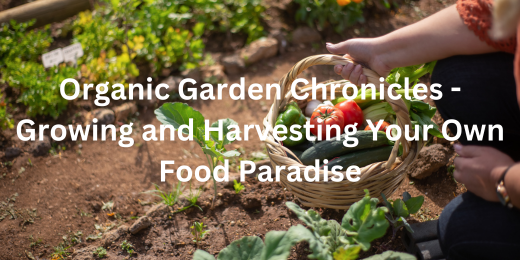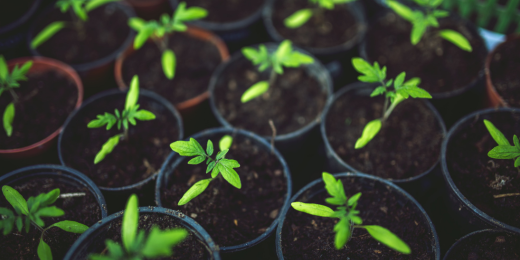
Organic Garden Chronicles -Growing and Harvesting Your Own Food Paradise
Introduction to Organic Gardening
Organic gardening for beginners is growing plants without using synthetic chemicals, resulting in a better environment. This method encourages sustainable practices, ensuring the ecosystem remains balanced. Additionally, it contributes to the conservation of biodiversity, providing a haven for beneficial insects and wildlife.
One of the key benefits of organic gardening is the production of chemical-free, nutritious food. These organic gardening tips help beginners understand the importance of using natural compost and fertilisers. This practice not only improves soil health but also enhances the growth and taste of the produce.
Understanding soil health is crucial for successful organic gardening. Healthy soil teems with microorganisms that aid plant growth and nutrient absorption. By following organic gardening tips, beginners can learn to maintain soil fertility, ensuring their garden thrives sustainably over time.
Planning Your Organic Garden
Starting an organic garden for beginners can be a rewarding experience, but a little planning goes a long way! The first step is to choose the perfect location for your garden. Your plants grow best in a place that receives approximately six to seven hours of direct sunlight per day. Easy access to water is also important, so consider placing your garden near a hosepipe or tap.
Once you have chosen your location, it is time to select the plants you will grow. Organic gardening tips recommend choosing varieties that thrive in your climate. For example, if you live in a hot and sunny region, tomatoes, chillies, and eggplants would be good options. Do not forget to account for the area you have available as well; some veggies need more space to develop than others.
Finally, creating a simple layout for your garden will help you maximize space and make it easier to manage. Sketch out a plan on paper, considering the size of your chosen plants and their spacing needs. This will also help you determine how many plants you can comfortably fit in your garden bed.

Soil Preparation and Maintenance
Healthy soil is the foundation of a thriving organic garden for beginners. Before planting, it is important to test your soil’s pH level, which indicates its acidity or alkalinity. Simple home testing kits are readily available and can help you determine if your soil needs any adjustments.
Organic gardening tips recommend amending your soil naturally. If your soil is too acidic, adding a little lime can help balance it out. Composting kitchen scraps and yard waste is a fantastic way to create nutrient-rich compost that feeds your plants and improves soil health over time.
Applying mulch around your plants is another essential organic gardening tip. Mulch controls soil temperature, inhibits weed growth, and helps the soil retain moisture. For mulch, organic materials such as bark, wood chips, and straw are all great options.
Planting and Growing Techniques
Now that your garden bed is prepared, it is time for the exciting part – planting! Organic gardening for beginners often involves using seeds. When selecting seeds, choose high-quality, open-pollinated varieties from reputable sources. These seeds will produce plants that can be saved and replanted the following season, unlike hybrid varieties.
Organic gardening tips recommend using companion planting strategies to benefit your garden. Certain plants, when planted near each other, can deter pests or attract beneficial insects. For example, planting marigolds around your tomatoes can help repel unwanted insects.
Lastly, enough irrigation is essential to the establishment of healthy plants. Organic gardening tips suggest deep watering your plants less frequently, rather than shallow watering every day. This encourages roots to grow deep into the soil, making plants more resilient during dry spells.
Pest and Disease Management
Organic gardening for beginners involves effective pest and disease management to maintain a healthy garden. Important natural pest management methods include the use of neem oil and beneficial insect introduction. These methods assist in pest management without endangering your plants or the surrounding area.
Identifying common plant diseases early is crucial for maintaining plant health. Regularly inspect plants for signs of disease, such as yellowing leaves or unusual spots. These organic gardening tips will help you take swift action to protect your garden.
Using organic remedies and treatments ensures your garden remains chemical-free. Homemade solutions like garlic spray or compost tea can treat various plant issues. By following these organic gardening tips, beginners can manage pests and diseases naturally and effectively.
Harvesting and Storing Your Produce
Organic gardening for beginners emphasizes the importance of timing your harvest for optimal flavour. For example, leafy greens like lettuce are best picked young and tender, while vegetables like tomatoes or pumpkins benefit from being left on the vine until fully ripe. Organic gardening tips recommend consulting a planting guide or seed packet for specific harvest times for each vegetable or fruit.
When harvesting your produce, use proper techniques for picking and handling. To prevent harming the plants, use sharp objects like a knife or pruning shears. Handle your harvest gently to prevent bruising, which can shorten storage life. Some vegetables and fruits, like tomatoes, have specific picking points – research the best way to harvest each variety for optimal results.
Organic gardening tips offer various methods for storing and preserving your fresh produce. Enjoy your harvest right away for the most vibrant flavours, or store vegetables and fruits in the refrigerator for a few days. By using methods like canning, freezing, or drying, you may increase the shelf life of your produce and use your fresh produce all year long.
Ready to explore the world of organic gardening? Visit your nearest Uyir Organic Farmers Market for hands-on experience and helpful advice. You can also learn more online at www.uyironline.in or www.uyirorganic.farm.